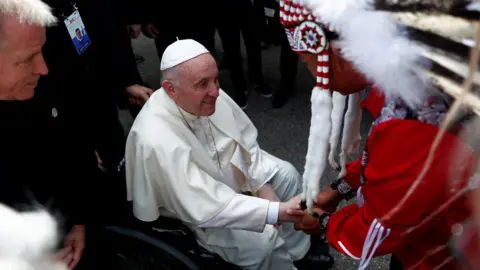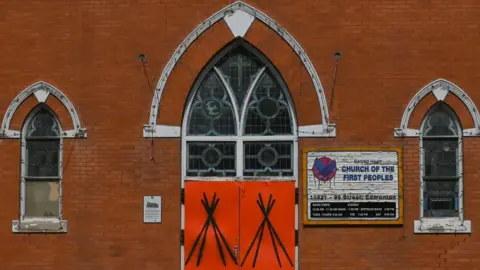Pope Francis: The pontiff's 'pilgrimage of penance' to Canada
 Reuters
ReutersThe Pope is making a historic visit to offer a formal apology on Canadian soil for the harms done by Catholic-run residential schools across the country.
Pope Francis, 85, has called the visit a "pilgrimage of penance", and has said he hopes it will help heal the wrongs done to indigenous people in Canada by the Roman Catholic Church.
His itinerary includes stops in the provinces of Alberta and Quebec and the northern territory of Nunavut.
Absent from the Pope's visit, however, is a stop in British Columbia, where the discovery last summer of evidence of some 200 unmarked graves on the grounds of a former residential school led to nationwide calls for reconciliation.
The Pope will be in Canada until Friday.
Why is the Pope visiting?
Canada has grappled with the path to reconciliation - repairing the relationship between indigenous people, non-indigenous people and the government - in recent years.
In 2015, abuses suffered by residential school survivors were highlighted in a landmark report by Canada's Truth and Reconciliation Commission (TRC).
The government-funded schools were part of a policy meant to assimilate indigenous children and destroy indigenous cultures and languages.
Some 150,000 First Nations, Métis and Inuit children were taken from their families during this period and placed in these schools.
The Roman Catholic Church operated up to 70% of residential schools. There were more than 130 such schools scattered across the country, the last closing in 1996.
The TRC report highlighted the stories of school survivors. Many were subjected to abuse, illness and malnutrition and the TRC called the residential schools system a central element of a policy of "cultural genocide".
One of the report's "Calls to action" was a request for the Pope to apologise for the Catholic Church's role in running the schools.
In May 2021, evidence, using ground-penetrating radar technology, of the unmarked graves of children at a former school site were found in Tk'emlúps te Secwépemc, a First Nations community in British Columbia.
The discovery received international attention and sent shockwaves across Canada.
Other First Nations began conducting similar searches near the sites of residential schools and, to date, evidence of over 1,000 graves has been found.
These findings intensified calls from indigenous leaders for a formal apology from the Pope.
In April, he apologised to an indigenous delegation who had travelled to the Vatican, saying the residential schools caused him "pain and shame".
He promised to meet indigenous communities in Canada and to assist with reconciliation efforts.
What is the Pope's schedule in Canada?
A mix of public events and private meetings make up the bulk of the Pope's itinerary.
The pontiff's first stop is in Alberta. On Monday, he will visit the former site of Ermineskin Indian Residential School - one of the largest in Canada - in Maskwacis, a First Nations community south of the city of Edmonton, where he will make his first public address in the country.
"For survivors from coast-to-coast, this is an opportunity - the first and maybe last - to perhaps find some closure for themselves and their families," Chief Randy Ermineskin said in a statement.
"This will be a difficult process but a necessary one."
In Edmonton on Monday evening, the Pope will attend Mass and visit the Sacred Heart Church of the First Peoples, the first national parish for indigenous peoples in Canada.
 urPhoto via Getty Images
urPhoto via Getty ImagesPope Francis is also expected to visit Lac Ste Anne, the site of a major annual pilgrimage - one of the largest Catholic gatherings in western Canada - in a prominent First Nations and Métis community.
On Wednesday, he will deliver a public address in Quebec City following a meeting with Prime Minister Justin Trudeau and Governor General Mary Simon, the first indigenous person to hold that position.
Pope Francis will celebrate Mass the following day in Sainte-Anne-de-Beaupre, a pilgrimage site for Roman Catholics on the Saint Lawrence River, with 15,000 guests expected to be in attendance.
The Pope's visit will end with a flight to Iqaluit in Canada's northern territory of Nunavut, where he is expected to speak privately with residential school survivors and attend a public community event.
A 'significant' visit after decades of activism
Canada's indigenous leaders welcomed the Pope's apology in Rome, but many hope the pontiff will now expand on his historic remarks.
Crystal Gail Fraser, a Gwichyà Gwich'in assistant professor of history and native studies at the University of Alberta, said the Pope's visit was "significant", and followed decades of activism and calls for accountability from indigenous communities.
Allow X content?

The discovery of the unmarked graves, she added, is a big reason why the trip is happening now.
Ms Fraser, who also sits on the governing circle of Canada's National Centre for Truth and Reconciliation, said she will be looking for more than just an apology from Pope Francis.
"Like many other times in Canadian history, we have seen apologies come and go," Ms Fraser said. "So for me, I'm going to be looking for the actions of the Catholic Church next."
This includes compensation for survivors and releasing documents about former staff and clergy who operated the schools, she said.
"We're still in the pursuit of truth," Ms Fraser said.
Some indigenous leaders want the Catholic Church to renounce a doctrine issued as a series of papal bulls - official documents issued by the Pope - and dating from the 1400s, saying it was used as "legal and moral justification for colonial dispossession" of indigenous people.
Pope Francis has also been criticised for failing to include Tk'emlúps te Secwépemc on his itinerary despite a formal invitation.
The Union of BC Indian Chiefs accused the Pope of showing "blatant disregard" for meaningful acknowledgement of harms done in residential schools.
But given the Pope's "advanced age and the size of Canada", the Canadian Conference of Catholic Bishops, tasked with planning his visit, said it focused on "a targeted group of communities" despite several requests to visit sites across the country.
Pope Francis has recently faced health issues, and has been using a wheelchair since May. Ongoing problems with his knee forced him to cancel a recent trip to Africa.
